August 15, 2024
SEOUL – Seventy-nine years after Korea’s liberation from Japan’s colonial rule (1910-1945), the lingering scars of that turbulent history continue to cast a shadow over bilateral relations, complicating efforts to build future-oriented ties.
Although historical disputes between South Korea and Japan remain unresolved, recent efforts by the Yoon Suk Yeol and Fumio Kishida administrations aim to move beyond the past and work towards the future, despite ongoing public debate over these initiatives.
Opinions on Yoon’s policies toward Japan are sharply divided in Korea. Some view them as part of a pragmatic and adaptable strategy in response to the rapidly evolving geopolitical landscape, while others argue they represent a unilateral concession that fails to tackle the underlying historical issues.
As Seoul and Tokyo approach the 60th anniversary of the normalization of their diplomatic relations next year, however, a crucial question remains: How can Korea address entrenched historical disputes in a way that sustainably resolves the issues but also lays the foundation for a better and shared future?
The Korea Herald, on the occasion of the 79th anniversary of Liberation Day, asked experts, historians and former diplomats in Seoul to explore the dynamics of South Korea-Japan relations and examined whether reconciling historical grievances could enable cooperation between the two countries in an era of economic uncertainty and security challenges, especially for Koreans still deeply affected by the scars of the dark past.
Addressing this challenge requires a thorough examination of the Yoon government’s Japan policies, which prioritize improving relations through rational solutions that align mutual interests.
The disputes stem from Tokyo’s steadfast position that all wartime issues were conclusively settled under the 1965 treaty that normalized bilateral relations, a stance rejected by South Korean courts, which have upheld the right of Korean victims to seek compensation for forced labor claims.
The Yoon administration has taken significant steps to mend strained relations with Japan, most notably by implementing a third-party reimbursement scheme in March 2023. The initiative compensates victims of Japan’s wartime forced labor using donations from Korean companies that had benefited from the funds provided by Japan under the 1965 treaty.
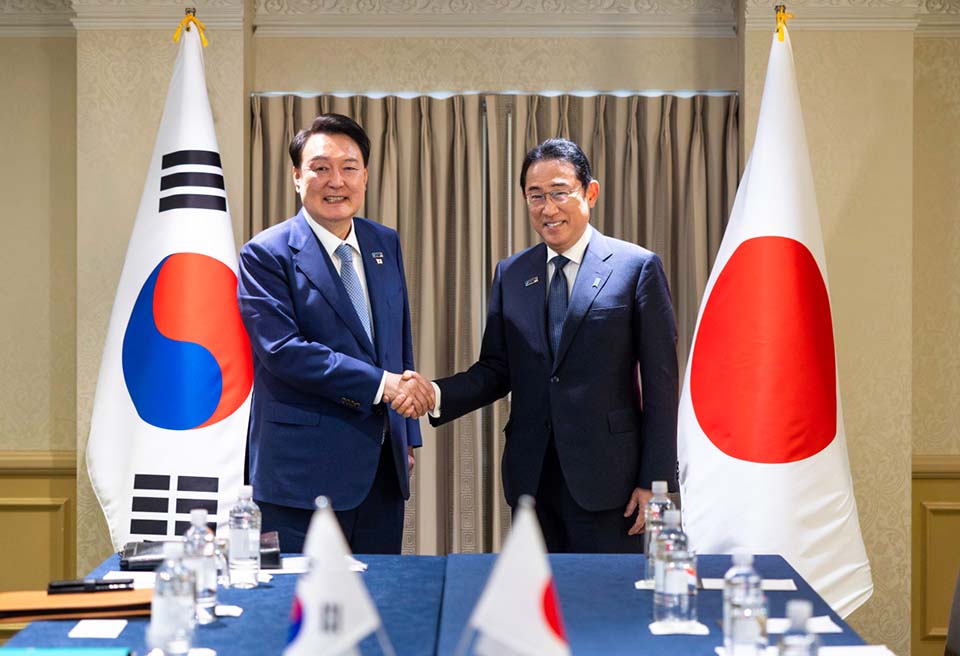
Children run with pinwheels displaying the national flag, known as Taegeukgi, at Seodaemun Prison History Hall in western Seoul on Wednesday, a day before the 79th National Liberation Day. PHOTO: YONHAP/THE KOREA HERALD
Pros
Experts who support Yoon’s Japan policies cite external factors driving closer Korea-Japan cooperation, including escalating North Korean threats, supply chain disruptions exacerbated by COVID-19, the intensifying US-China rivalry and deteriorating Korea-China relations following the US THAAD deployment in Korea.
The Biden administration’s focus on trilateral cooperation within its Indo-Pacific strategy has further emphasized Seoul’s need to strengthen ties with Tokyo.
“Decisions on historical issues that may not achieve full consensus are pragmatic and highly calibrated choices in the current context,” said Jo Yang-hyeon, head of the Center for Japanese Studies at the Institute of Foreign Affairs and National Security.
Jo explained that the Yoon administration’s focus on trilateral cooperation over historical issues is a strategic response to pressing international challenges, aimed at ensuring South Korea remains a central player in shaping the Indo-Pacific region’s rules.
The approach seeks to change the foreign policy strategy of the previous Moon Jae-in administration, which was cautious about joining key regional initiatives like the Indo-Pacific Economic Framework for Prosperity and the Quadrilateral Security Dialogue amid the years-long strained relations with Japan, among other reasons.
“Why was this sequence of priorities chosen? Does it mean that historical issues are less important? No, It’s largely a question of timing,” Jo explained. “In today’s rapidly shifting global landscape, missing this opportunity could once again sideline South Korea in crucial Indo-Pacific developments, as occurred during the previous administration.”
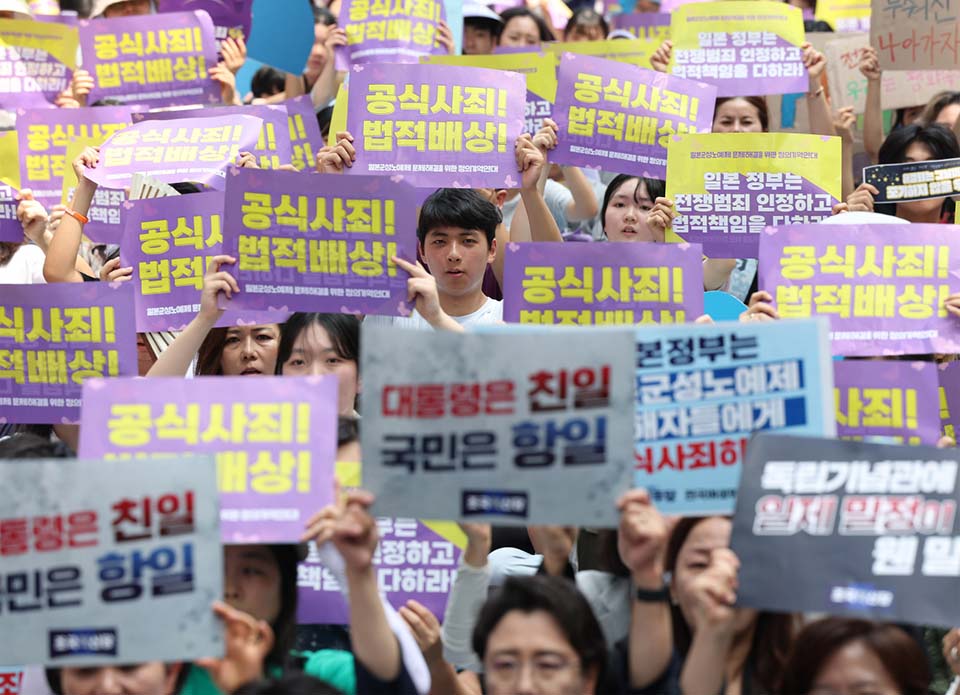
Participants chant slogans at the weekly anti-Japan protest near the Japanese Embassy in Seoul’s Jongno District, marking International Memorial Day for Comfort Women on August 14. This date honors the 1991 testimony of the late Kim Hak-sun, the first former comfort woman to publicly reveal Japan’s wartime military brothel system. PHOTO: YONHAP/THE KOREA HERALD
Cons
Yang Kee-ho, a professor of Japanese studies at Sungkonghoe University, criticized the Yoon government for entrenching the pattern of South Korea making concessions on historical disputes without securing public consensus.
Meanwhile, Japan continues to uphold a regressive historical narrative established during Shinzo Abe’s second term as prime minister, which began in 2012 and has yet to fulfill its previous commitments to acknowledging historical truths.
“The historical and territorial disputes between South Korea and Japan are central to the principles of the South Korean Constitution, making it impossible for us to either abandon or compromise on these matters,” Yang said.
Yang explained that the March First Independence Movement — which began on March 1, 1919 — against Imperial Japan, is more than a historical event; it is a cornerstone for South Korea, with its spirit enshrined in the Constitution and its legacy upheld by the Provisional Government it inspired.
“If we fail to stand firm on the principles of our Japan policy, rooted in the fundamental spirit of our Constitution, we risk repeatedly making significant concessions to Japan,” Yang said.
“While acknowledging the reality that resolving the Korea-Japan historical conflicts in the short term is unlikely … it is crucial to continue negotiations while upholding our core principles. To achieve this, we must develop plans that secure domestic consensus, ensuring a stable and sustainable process moving forward.”
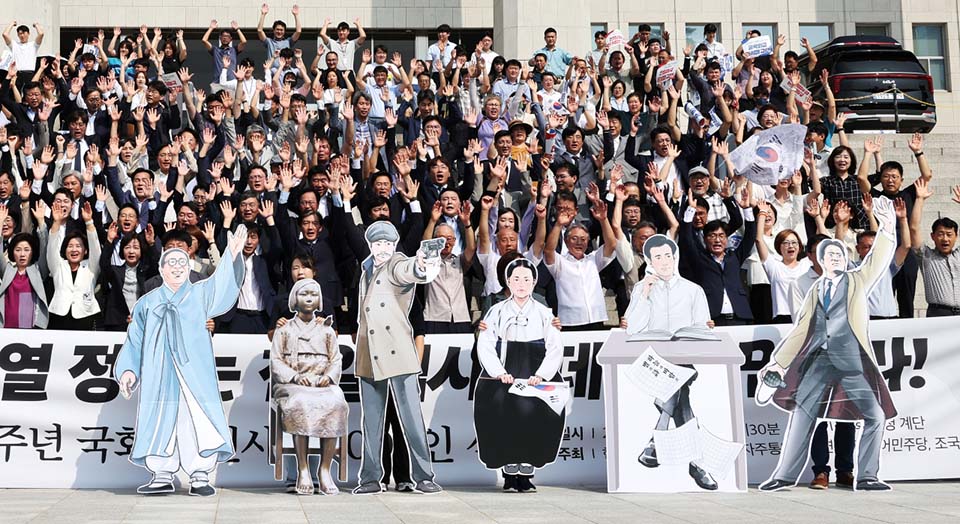
The National Assembly in Seoul hosts the “National Assembly-Civil Society 1000-Person Declaration” event on Wednesday, one day before the 79th Anniversary of Liberation. Participants, including Democratic Party Acting Chair and Floor Leader Rep. Park Chan-dae and Rebuilding Korea Party leader Cho Kuk, chant slogans in solidarity. PHOTO: YONHAP/THE KOREA HERALD
National consensus
Choi Eun-mi, a research fellow at the Asan Institute for Policy Studies, commended the Yoon administration’s efforts to “break the vicious cycle” in Korea-Japan relations, where historical disputes have long overshadowed other critical issues.
However, Choi noted, “The government could have done more to foster broader public consensus” in addressing historical disputes with Japan, particularly concerning the third-party reimbursement for victims of forced labor, given the high public interest in issues between Seoul and Tokyo.
Choi observed, “While the approach was undoubtedly pragmatic, opting for a feasible solution over an idealistic one, this practicality, though necessary, significantly neglected the emotional aspects of Korea-Japan relations, which are equally vital.”
The Yoon government’s direct engagement with forced labor victims differed from previous administrations, resulting in 11 out of 15 victims receiving compensation through third-party reimbursement following the 2018 Supreme Court ruling. However, these efforts were not effectively communicated to the public, according to Choi.
While then-Foreign Minister Park Jin announced the reimbursement, a direct statement from Yoon would have reinforced the message.
In a March 2023 Gallup Korea poll, only 35 percent of Korean citizens expressed support for Yoon’s proposal for third-party compensation, with around 60 percent opposed to it.
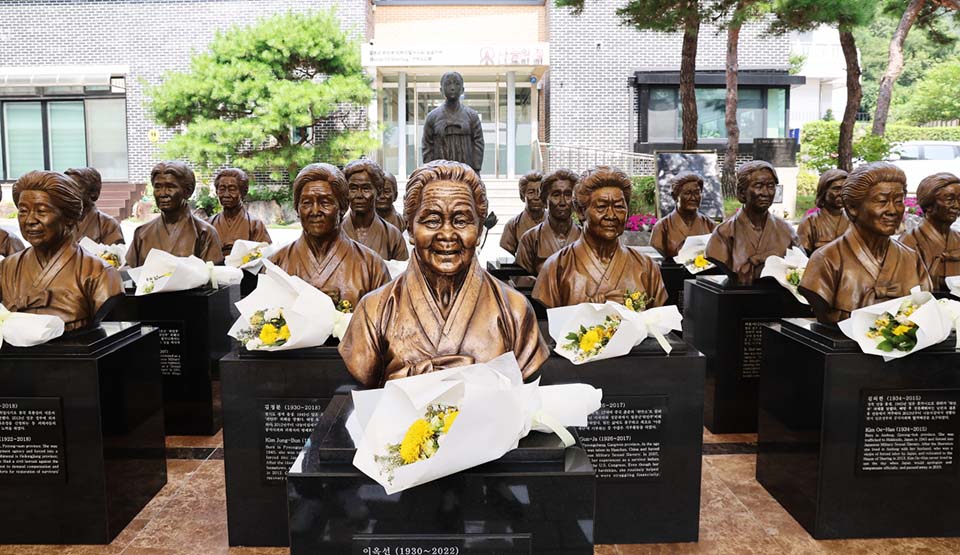
Flowers are laid upon the busts of the late victims of sexual slavery by the Japanese military during World War II at the House of Sharing, a facility dedicated to such women, euphemistically called “comfort women,” in Gwangju, 32 kilometers southeast of Seoul, on Tuesday, one day ahead of the International Memorial Day for Comfort Women. PHOTO: YONHAP/THE KOREA HERALD
Root causes
Observers underscored the importance of Seoul addressing the root causes of its historical disputes with Tokyo, rather than getting bogged down by the ongoing and inevitable disagreements over unresolved issues.
“The Korea-Japan relationship, which has broken free from a decade of stagnation, is now regarded as being on the road to recovery. Nevertheless, numerous unstable factors persist,” said Shin Kak-soo, former Korean ambassador to Japan, who has also served as both first and second vice foreign minister in the then-Lee Myung-bak administration.
For example, Korean courts have been ruling on cases involving forced labor victims, and the depletion of the third-party reimbursement fund has raised concerns that this situation could strain bilateral ties.
“The most crucial task is to cultivate historical awareness among the Japanese public that the 35 years of colonial rule were fundamentally unjust,” Shin said.
“This requires rigorous historical research to establish a clear and accurate understanding of the past, which should then be integrated into the education of future generations.”
Shin highlighted how this crucial effort has been largely overlooked, as both Korea and Japan have become narrowly focused, mired in contentious historical disputes.
“To truly move forward, we must prioritize historical research and education, allowing historians the space to do their work,” Shin said.
“Moreover, fostering exchanges that address the deep-seated misunderstandings and mistrust between the two countries is vital. This process of historical reconciliation must be undertaken with a long-term perspective, ensuring that it is both thorough and enduring.”
Shin and Jeong Hye-gyeong, a lead researcher at the Peace Study Society on Forced Mobilization of Koreans by Imperial Japan, jointly emphasized the importance of reviving the “Korea-Japan Joint History Research Committee.” The committee was established by both governments in 2001, and joint research was conducted on two occasions until 2009.
Shin also proposed the development of a shared history textbook for both countries’ educational systems.
“The current strategic landscape necessitates that South Korea and Japan acknowledge their mutual need as strategic partners,” Shin said.
“As we strive to meet these demands, it is equally vital for both countries to confront historical issues with honesty and transform them into lessons for the future. Though challenges are inevitable, I believe this approach is within reach.”
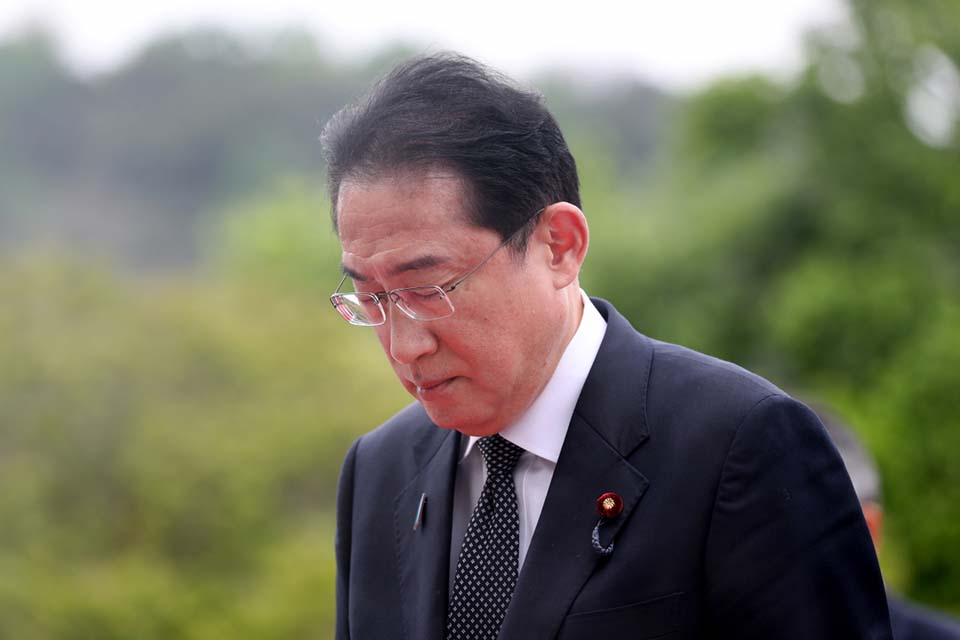
Japanese Prime Minister Fumio Kishida pay silent tribute to South Korean patriotic martyrs and war dead at the National Cemetery in Seoul on May 7, 2023. PHOTO: POOL PHOTO VIA THE KOREA HERALD
Accountability
Jeong criticized past and the current Yoon governments for “treating historical issues between Korea and Japan merely as diplomatic issues.”
Japan mirrors this with its own inconsistency and lack of responsibility for historical issues.
“We must approach historical issues with a deep sense of responsibility and in a consistent and sustained manner, given the position of a victim country,” Jeong said. “To that end, the first step is to reopen the commission dedicated to investigating Japan’s forced mobilization of Korean laborers, which had previously been shut down. This is a must as a victim country.”
The Commission on Verification and Support for Victims of Forced Mobilization, launched in 2004 under the Prime Minister’s Office, encountered numerous challenges and was dissolved in 2015.
“To effectively address the ongoing historical disputes with Japan, it is imperative to establish an investigative body dedicated to systematically gathering and consolidating factual evidence and documentation. We can present Japan with truths, compelling them to acknowledge their wrongdoings and ultimately, accept responsibility,” Jeong said.
Jeong explained that there are around 8,800 relics from Japanese wartime sites evidencing colonial rule, including the Japanese Army Arsenal in Bupyeong. These should be preserved for public benefit, possibly by inscribing them as a World Heritage site.
South Korea must also cultivate experts in Japanese colonial history, a field where Korean expertise is currently almost nonexistent.
“As historian Kang Deok-sang pointed out, the people of both Korea and Japan must bear the weight of this historical truth. Ignoring it will never allow us to address the historical issues between our countries, nor will it enable us to maintain a healthy relationship with Japan,” Jeong said.
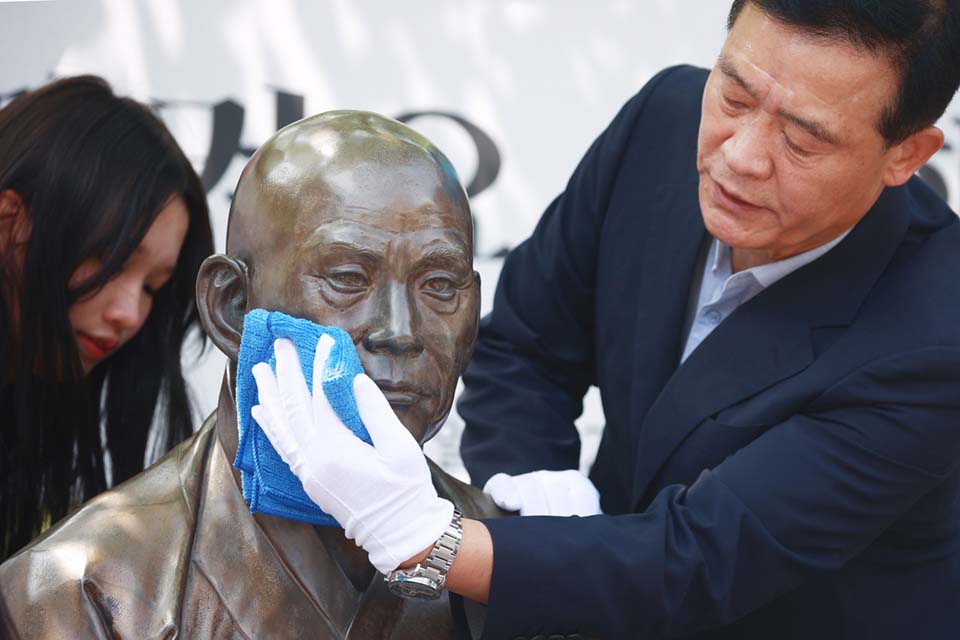
The statue of independence activist and poet Han Yong-un is cleaned at Manhae’s Walking Park in Seongbuk-gu district, Seoul, on Wednesday. Han, also known by his pen name Manhae, was a revered poet, Buddhist monk, and independence activist who played a pivotal role in Korea’s fight for liberation from Japanese colonial rule. PHOTO: YONHAP/THE KOREA HERALD
Path to future
Yuji Hosaka, a professor of political science at Sejong University, reiterated: “I don’t believe we can build a future-oriented relationship by completely covering up and distorting historical issues. Doing so would be a distortion, not a genuine path toward a future-oriented relationship.”
Survey results from around 1,000 South Korean Koreans and Japanese, conducted from August to September last year by Seoul-based East Asia Institute and Japan’s Genron NPO, revealed a nuanced picture.
Positive assessments of bilateral relations among Koreans increased from 4.9 percent in 2022 to 12.7 percent in 2023. In Japan, positive evaluations rose from 13.7 percent to 29 percent.
Despite these improvements, historical issues continue to weigh heavily on relations. Both Korean and Japanese respondents identified resolving historical disputes, addressing the Dokdo islets issue and improving historical perceptions and education as the top three conditions for strengthening ties.
Moreover, 22 percent of Koreans believe a reflection and apology from Japan for its colonial rule should be a top priority in any new joint declaration with Japan.
“As the 60th anniversary approaches, both countries are eager to mark this milestone with significant achievement. However, realizing the goal will remain elusive unless historical issues are addressed … despite the inherent challenges,” Choi said.
Choi elucidated that for the relationship between the two countries to be truly sustainable, it must be accompanied by a consistent and ongoing shift in action, particularly regarding historical issues, both from Seoul and Tokyo.
“This cannot be a one-time initiative,” Choi asserted. “It demands a continuous and cumulative approach.”
Choi underscored that a consistent stance on Japan policies is essential, regardless of whether the Democratic Party or the People Power Party is in power, and the same applies to Japan.

Lee Yong-soo, a 96-year-old survivor of Japan’s wartime sexual slavery, lays flowers at the Statue of Peace at Daegu Girls’ Commercial High School in Daegu on Wednesday to mark International Memorial Day for Comfort Women that falls on August 14. Some 200,000 Asian women, mostly Koreans, were forcibly sent to front-line brothels to work as sex slaves, euphemistically called “comfort women,” for Japanese troops during World War II. PHOTO: YONHAP/THE KOREA HERALD
Experts shared the view that sustainability in the trajectory of improving relations requires consistent policies from both sides.
Lee Ki-tae, director of the Global Strategy Research Division at the Korea Institute for National Unification, stated, “Political circles must make a concerted effort to avoid using Korea-Japan relations as a tool for domestic politics.”
“It is also crucial to establish a consistent policy toward Japan that transcends political divisions between conservatives and progressives. This requires setting fundamental principles to guide our approach to Japan,” Lee said.
The key principles for Korea-Japan relations could include mutual recognition of historical disputes alongside a commitment to future-oriented cooperation; reciprocity to guarantee mutual benefit and collaboration; inclusivity by respecting differing perspectives and values; and joint action to tackle shared challenges such as climate change, low birth rates, aging populations and regional security for future-oriented cooperation.
“Moreover, for the stable advancement of Korea-Japan relations, it is vital to continue establishing and institutionalizing cooperation mechanisms across multiple sectors,” Lee said.
Lee underscored that just as it is vital to clearly communicate the benefits of unification to garner public consensus on unification matters, the same approach is essential for strengthening ties between Korea and Japan.
“The most critical task is to clearly articulate the tangible benefits of cooperation with Japan to the public, as building a national consensus hinges on this understanding,” Lee said. “Achieving public consensus also requires upholding grand principles agreed upon by both conservative and liberal blocs, ensuring consistency in Japan policy regardless of changes in government.”


